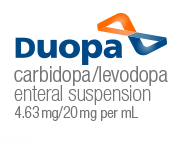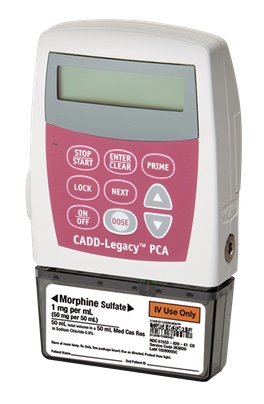CONy16: AbbVie’s DUOPA Pump Continues to Show Efficacy as Parkinson’s Treatment; Exclusive Interview with a Lead Researcher

Multinational research-based biopharmaceutical company AbbVie‘s product DUOPA is a fresh approach to the administration of carbidopa and levodopa for the treatment of motor fluctuations that afflict people with advanced Parkinson’s disease. A researcher, in an exclusive interview with Parkinson’s News Today at the recent 10th World Congress on Controversies in Neurology (CONy), in fact, called it “a wonderful tool.”
The carbidopa and levodopa combination is widely recognized as an effective treatment for Parkinson’s disease-associated motor fluctuations, but the chemical properties of these drugs require patients to ingest large volumes of water throughout the day, making the oral administration onerous for a variety of reasons.
 AbbVie’s DUOPA is a gel suspension of levodopa/carbidopa administered using a small, portable infusion pump that delivers the medication directly into the small intestine for 16 continuous hours daily. Long-term use requires a PEG (percutaneous endoscopic gastrostomy) tube, containing a smaller-bore intestinal tube, procedurally placed beyond the pylorus via a small hole (stoma) in the patient’s gastrointestinal tract. This allows for immediate absorption across the intestinal mucosa in the duodenum or proximal jejunum. Clinical response to the therapy can be tested prior to establishing a PEG through temporary DUOPA administration through a naso-jejunal tube.
AbbVie’s DUOPA is a gel suspension of levodopa/carbidopa administered using a small, portable infusion pump that delivers the medication directly into the small intestine for 16 continuous hours daily. Long-term use requires a PEG (percutaneous endoscopic gastrostomy) tube, containing a smaller-bore intestinal tube, procedurally placed beyond the pylorus via a small hole (stoma) in the patient’s gastrointestinal tract. This allows for immediate absorption across the intestinal mucosa in the duodenum or proximal jejunum. Clinical response to the therapy can be tested prior to establishing a PEG through temporary DUOPA administration through a naso-jejunal tube.
Using a carboxymethyl-cellulose gel suspension, the concentration of levodopa is maintained at 20 mg/mL, making a pump cassette containing 100 mL a sufficient daily dose for most patients. Carbidopa and levodopa enteral suspension is currently approved in 41 countries, and is marketed by AbbVie as DUODOPA outside the United States.
DUOPA was approved by the U.S. Food and Drug Administration (FDA) in January 2015 as an orphan drug, a designation granted to products intended to treat rare diseases or conditions affecting fewer than 200,000 patients. According to the National Institutes of Health, U.S. National Library of Medicine, levodopa is in a class of medications called central nervous system agents. It works by being converted to dopamine in the brain. Carbidopa is in a class of medications called decarboxylase inhibitors, and works by preventing levodopa from being broken down before it reaches the brain. This allows for a lower dose of levodopa, which causes less associated nausea and vomiting.
The FDA based its approval of DUOPA, as a combination product for use with the CADD Legacy pump, partly on findings of a 12-week, double-blind, controlled-placebo Phase 3 multi-center trial that compared the efficacy and safety of the DUOPA pump-delivered gel suspension to that of oral, immediate-release (IR) carbidopa-levodopa tablets in advanced Parkinson’s disease patients.

 The CADD-Legacy PCA Pump device is manufactured by St. Paul, Minnesota-based Smith’s Medical, a manufacturer of medical products employing over 7,000 people in six continents.
The CADD-Legacy PCA Pump device is manufactured by St. Paul, Minnesota-based Smith’s Medical, a manufacturer of medical products employing over 7,000 people in six continents.
The study found that DUOPA therapy significantly reduced daily (per 16 waking hours) mean “off” time at 12 weeks by four hours, resulting in an average of 1.9 fewer hours of “off time” when compared to treatment with carbidopa-levodopa IR tablets. DUOPA treatment was also associated with an improved mean “on” time (periods when the medication is working and symptoms are controlled) without troublesome dyskinesia (uncontrolled movement that does not interfere with normal daily activities) by four hours at 12 weeks, resulting in an average of 1.9 hours more “on” time when compared to carbidopa-levodopa IR tablets.
DUOPA has been the subject of an array of AbbVie sponsored clinical trials, details of which can be found at: www.abbvie.com/research-innovation/clinical-trials-data-and-information-sharing/csr-synopses/levodopa-carbidopa.html
According to the FDA’s prescribing information for DUOPA, the carbidopa/levodopa suspension is administered over a 16-hour at a daily dose determined by individualized patient titration. The maximum recommended daily dose of DUOPA is 2000 mg of the levodopa component (i.e., one delivery pump cassette per day) administered over an infusion period of 16 hours. At the end of infusion, patients disconnect the pump from the PEG-J, and take a nighttime dose of oral immediate-release carbidopa-levodopa tablets. Full prescribing information for DUOPA, including the Medication Guide, can be found at www.rxabbvie.com.
 “There is unmet need for treatment options for patients with advanced Parkinson’s disease. As the disease advances, it can be difficult to control motor features,” C. Warren Olanow, MD, FRCPC, the Henry P. and Georgette Goldschmidt Professor and Chairman Emeritus of the Department of Neurology, a professor in the Department of Neuroscience at the Mount Sinai School of Medicine in New York City, and lead investigator of the DUOPA trial, said in a press release. “In clinical trials, DUOPA was shown to significantly reduce the amount of off time advanced Parkinson’s disease patients experienced.”
“There is unmet need for treatment options for patients with advanced Parkinson’s disease. As the disease advances, it can be difficult to control motor features,” C. Warren Olanow, MD, FRCPC, the Henry P. and Georgette Goldschmidt Professor and Chairman Emeritus of the Department of Neurology, a professor in the Department of Neuroscience at the Mount Sinai School of Medicine in New York City, and lead investigator of the DUOPA trial, said in a press release. “In clinical trials, DUOPA was shown to significantly reduce the amount of off time advanced Parkinson’s disease patients experienced.”
Parkinson’s disease is a progressive and chronic movement disorder characterized by tremor, muscle rigidity, slowness of movement and balance difficulty resulting from loss of brain cells that produce the brain chemical dopamine. Motor symptoms of Parkinson’s begin at the point when approximately 60–80 percent of the dopamine-producing cells in the brain have been lost, and symptoms continue to worsen slowly over time. There is no known cure for the disease.
AbbVie’s investigators note that as Parkinson’s progresses, patients may experience fluctuations from an “on” state to an “off” state, periods of poor mobility during which they are slower, stiffer and experience more difficulty moving. Patients may also experience dyskinesias. Additionally, digestion can be delayed and unpredictable, which can affect the timing of when orally administered medicines leave the stomach and are absorbed in the small intestine. DUOPA therapy provides patients with the same active ingredients as orally administered, immediate release carbidopa and levodopa, but delivers them directly into the small intestine, bypassing the stomach.
 “The FDA approval of DUOPA is another significant milestone for AbbVie’s pipeline,” said AbbVie’s executive vice president, Research and Development, and chief scientific officer, Michael Severino, MD, at the time of the FDA announcement. “This advancement is important for patients with advanced Parkinson’s disease and their care teams, as it provides a new therapeutic option to help manage motor symptoms.”
“The FDA approval of DUOPA is another significant milestone for AbbVie’s pipeline,” said AbbVie’s executive vice president, Research and Development, and chief scientific officer, Michael Severino, MD, at the time of the FDA announcement. “This advancement is important for patients with advanced Parkinson’s disease and their care teams, as it provides a new therapeutic option to help manage motor symptoms.”
“Due to the progressive nature of Parkinson’s disease, it can be difficult to treat over time, especially in the advanced stages,” said Joyce Oberdorf, then president and CEO of the Parkinson’s Disease Foundation. “Our organization is encouraged by the introduction of a new therapy that may provide another treatment option for affected patients and families.”
The most commonly reported adverse events associated with DUOPA therapy were the complication of device insertion, nausea, constipation, incision site erythema, dyskinesia, depression, post procedural discharge, peripheral edema, hypertension, upper respiratory tract infection, oropharyngeal pain, atelectasis, confusional state, anxiety, dizziness and hiatal hernia.
As previously reported by Parkinson’s News Today, AbbVie is a member of the Critical Path for Parkinson’s (CPP) Consortium, composed of seven large pharmaceutical companies, with UCB, Pfizer, Merck & Co, Eli Lilly and Company, Biogen, and AstraZeneca. The companies have joined in a groundbreaking collaboration to share data, expertise and resources to accelerate development of safe and effective therapies for Parkinson’s disease.
AbbVie sponsored a symposium titled “Clinical Symptoms Versus Patient-Related Outcomes: What Should Be the Basis of Decision-Making in Advanced Parkinson’s Disease?” at the CONy Congress, which ran from March 17–20, 2016, in Lisbon, Portugal. Heinz Reichmann, a professor of Neurology and dean of the Medical Faculty, University of Dresden Medical School, Germany, presented at the symposium, where he discussed clinical perspectives in advanced Parkinson’s disease.
Parkinson’s News Today had the opportunity to interview Professor Reichmann at CONy, and asked him about the DUOPA system. “The major issue is that you have a continuous dopamine replacement, that means you have continuously dopamine delivered to the blood, and this goes directly to the brain; and because of this, we have probably a continuous dopamine receptor stimulation,” he said. “This brings good mobility, and avoids dyskinesia, so it is a wonderful tool.”
He also thought the system has a good safety record. “The only concern that we have, and we monitor that, is the vitamin B12 deficiency. Everything else is no big deal. So, only the B12 has to be monitored, nothing else,” Professor Reichmann said.
The complete interview with Professor Reichmann is available through this link, or by clicking on the video below.
AbbVie
The National Institutes of Health U.S. National Library of Medicine
Smith’s Medical
National Parkinson Foundation
The Critical Path for Parkinsons (CPP) Consortium
he Michael J. Fox Foundation for Parkinson’s Research
DANMODIS; Danish Movement Disorder Society
SWEMODIS, Swedish Movement Disorder Society






